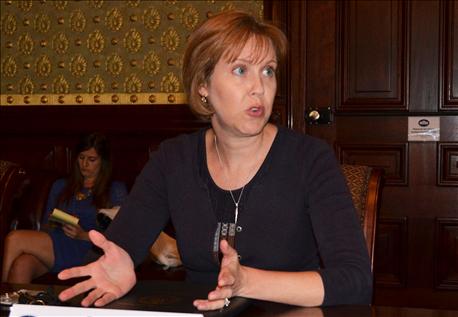
The politics continue to play out on trade support, especially with the expansive 12 country Trans-Pacific Partnership deal ready to be ratified by Congress. It looks like the lame duck session holds the most potential for bringing it up, and even then it faces an uphill battle as some remain skeptical of promises coming to fruition.
Chief Agricultural Negotiator Darci Vetter said there was strong bipartisan support for Trade Promotion Authority which provided the president negotiating power, and that bipartisan support still exists for trade, she added.

Speaking to journalists at the end of April, Darci Vetter, the U.S. Trade Representative's chief agricultural negotiator, said an attempt to ratify the trade deal during the lame-duck session is a fair assessment as Senate majority leader Mitch McConnell, R., Ky, has mentioned that it would be hard to bring up TPP before then. Vetter is actively engaged on Capitol Hill in explaining what's in the TPP agreement trade texts and tariff schedule. Photo source: John Vogel
However, Vetter stated that somehow trade has become a “boogeyman” for this election. “I still think despite the campaign rhetoric, there is a great story about the public opinion about trade and it is still positive.”
U.S. Trade Representative Michael Froman spoke at the National Cattlemen’s Beef Assn., spring fly-out earlier this spring. “We need to get beyond sound bites and get to a fact-based discussion. I think if we do, we’ll have a supportive Congress,” Froman said.
Vetter has been working with agricultural groups to help connect the dots between the paper and pocketbooks. She said the intellectual property, sanitary and phytosanitary, labor and environment measures all seek to create stronger protections.
The Obama Administration continues to say that the U.S., not China, needs to lead on global trade. However, the timeline seems to be shortening on how quickly China could step into the driver’s seat if the U.S. doesn’t move to ratify TPP, President Barack Obama said in an op-ed published in the Washington Post.
China and 15 other nations met last at the end of April in Australia with a goal of getting their deal, the Regional Comprehensive Economic Partnership, done before the end of the year. Obama said the deal China is currently negotiating in its own backyard would carve up some of the fastest-growing markets in the world — at the U.S.'s expense, putting American jobs, businesses and goods at risk.
Froman said as he engages with Congressional members, they’re getting positive feedback. He cited a Peterson Institute report that found that a one-year delay in implementing TPP will cost the U.S. economy $94 billion, and he said that acts like a $700 tax on every house. He also cited an American Farm Bureau Federation study that found that TPP passage will eventually add $4.4 billion to annual net farm income.
Major agricultural groups including the dairy, beef, pork and AFBF have come out in support of the bill. But the National Farmers Union recently held a press conference to tout that “ag is not unanimously supporting” TPP. NFU led a group of over 160 food, farm and rural groups asking for Congress to reject TPP.
“We have 20 free trade agreements that we’ve entered into with lots of promises of new jobs and more economic growth and they have a history of them not being kept,” said NFU President Roger Johnson.
Rep. Rick Nolan, D- Minn., cited that 71% of foods imported into the United States come from nations that the United States has a FTA with, while only 35% of our exports go to FTA nations.
Nolan is part of a coalition of Congressional members opposing TPP and said they’re meeting sometimes multiple times a week to upgrade their strategy on derailing passage. He said he’s optimistic that they’ll be able to keep TPP from coming up between now and the election, but he’s deeply concerned about what Congress will try to do in a lame duck. He said he was “cautiously optimistic” it would be defeated in a lame duck.
Vetter continues to say the deal is incredibly important for the United States and puts the nation on the offense when it comes to breaking down tariff barriers. However, Rep. Collin Peterson (D., Minn.) criticized that the deal is not a free trade agreement, but rather a “managed” agreement that only provides increased access in different commodity areas. Very few tariff lines go to zero as many past FTAs do over a period of time, he criticized.
He also expressed frustration that Canada got off the hook in TPP after they “took us to the cleaners in NAFTA” he said of their limited access for dairy, poultry and eggs. TPP was the only chance to fix some of those issues and it doesn’t.
About the Author(s)
You May Also Like






